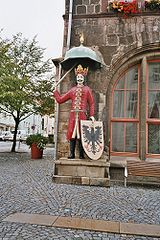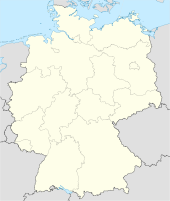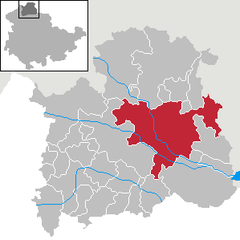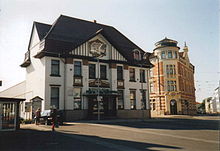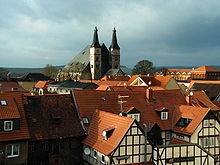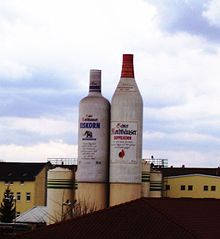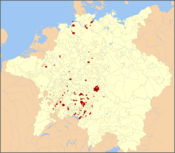- Nordhausen
-
For the album by And One, see Nordhausen (album). For the Nordhausen World War II facilities, see Mittelbau-Dora and Mittelwerk.
Nordhausen Statue of Roland in Nordhausen. 
Coordinates 51°30′18″N 10°47′28″E / 51.505°N 10.79111°ECoordinates: 51°30′18″N 10°47′28″E / 51.505°N 10.79111°E Administration Country Germany State Thuringia District Nordhausen Town subdivisions 12 Mayor Barbara Rinke (SPD) Basic statistics Area 105.27 km2 (40.64 sq mi) Elevation 185 m (607 ft) Population 44,296 (31 December 2010)[1] - Density 421 /km2 (1,090 /sq mi) Other information Time zone CET/CEST (UTC+1/+2) Licence plate NDH Postal code 99734 Area code 03631 Website www.nordhausen.de Nordhausen is a town at the southern edge of the Harz Mountains, in the state of Thuringia, Germany. It is the capital of the district of Nordhausen. It was once known for its tobacco industry, and is still known for its distilled spirit, Nordhäuser Doppelkorn.
Contents
History
Imperial City of Nordhausen
Reichstadt NordhausenFree Imperial City of the Holy Roman Empire ← 
1220–1802  →
→Nordhausen in the 17th century Capital Nordhausen Government Republic Historical era High Middle Ages - Settlement founded ca 785 - Reichsfreiheit 27 July 1220 - Reichsfreiheit
confirmed
1290- New city constitution 14 February 1375 - Joined Hanseatic
League
1430- Reformation 1523 - Ceded to Prussia 1802 - Ceded to Westphalia 1807–13 Today part of  Germany
GermanyThe town is first mentioned in a 13 May 927 document of King Henry the Fowler, but an earlier settlement on the site dates back to around 785. In 1220, Emperor Frederick II made it an Imperial Free City, and in 1430 Nordhausen joined the Hanseatic League. In 1500 it became part of the Lower Saxon Circle, and from around the same year the city began producing fermented grain liquor, which became famous under the name Nordhäuser Doppelkorn. In 1523, a year in which Thomas Müntzer spent some time in the city, the Protestant Reformation came to Nordhausen.
After the Peace of Westphalia in 1648, much of Nordhausen's surroundings became part of Brandenburg-Prussia, although the city itself remained independent. During the Napoleonic Wars, Prussian troops occupied Nordhausen on 2 August 1802; the city lost its status as an Imperial Free City during the German Mediatisation. It became part of the Kingdom of Westphalia created in 1807. Following the defeat of Napoleon Bonaparte, Nordhausen was included in the Kingdom of Prussia's Province of Saxony created in 1816. Nordhausen was an urban district from 1882-1950.
In 1866 Nordhausen became connected by railway to Halle.
The Mittelbau-Dora Nazi concentration camp was located on the outskirts of town during World War II to provide labor for the Mittelwerk V-2 rocket factory in the Kohnstein. On April 3 and 4 April 1945 three-quarters of the town was destroyed by bombing raids of the Royal Air Force, in which around 8,800 people died, including 1500 sick prisoners at the Boelcke Kaserne barracks within Nordhausen.[2] Earlier on August 24, 1944, 11 B-17 Flying Fortresses of Mission 568 bombed the airfield at Nordhausen as a target of opportunity.[3] On 11 April 1945, the Americans occupied the town, and on 2 July the Red Army took over. On 18 July the Soviet administration created the Institute Rabe to develop Soviet rocket technology on the basis of the substantially more sophisticated V-2 rockets. In May 1946 the Institute was subsumed into the new Institute Nordhausen, under an expanded programme of research across the Soviet occupation zone, including a new Institute Berlin. On 22 October 1946, under Operation Osoaviakhim, 10-15,000 German scientists, engineers and their families were deported to the Soviet Union, including around 300 from Nordhausen.[4] Transplanted along with their equipment, many remained there until the early 1950s.
Nordhausen was part of East Germany from 1949–1990 and was administered within Bezirk Erfurt. After the German reunification of 1990, Nordhausen was made part of the recreated state of Thuringia. Its medieval town centre has since been rebuilt. On 1 December 2007, the former municipalities Petersdorf, Rodishain and Stempeda were incorporated by Nordhausen.
Recent
Nordhausen has recently made international news due to a major labor dispute. Since 10 July 2007, 135 employees of the Biria bicycle factory (a subsidiary Bike Systems GmbH) have been occupying the factory and have resumed production, selling the cycles directly to consumers and retailers.[5]
Education
Main article: Nordhausen University of Applied SciencesNordhausen has a Fachhochschule (University of Applied Sciences) that offers Bachelor's and Master's degrees in business administration, public management, and business engineering, among others.[6]
Main sights
- A 17th-century Statue of Roland, at the outer wall of the Town Hall. It is considered a symbol of the town.
- The Cathedral of the Holy Cross (Dom „Zum Heiligen Kreuz“). It dates back to a church built in the mid-10th century. In 1220 the church was converted to a cathedral. The building has a late Gothic nave, while the towers, crypt and cloisters are in Romanesque style.
- The Frauenberger Kirche („St. Maria auf dem Berg“), a Romanesque church.
- The Petriturm (St. Peter's Tower), the remaining tower of a 14th-century church destroyed in 1945.
- The Kunsthaus Meyenburg, an early 20th-century Jugendstil villa that houses a small museum of contemporary art.
- The Theater, built in 1917.
Twin towns
The town is twinned with
References
- ^ "Bevölkerung nach Gemeinden, erfüllenden Gemeinden und Verwaltungsgemeinschaften" (in German). Thüringer Landesamt für Statistik. 31 December 2010. http://www.statistik.thueringen.de/datenbank/TabAnzeige.asp?tabelle=gg000102%7C%7C.
- ^ Béon, Yves (1997). Planet Dora: A Memoir of the Holocaust and the Birth of the Space Age. (translated from the French La planète Dora by Béon & Richard L. Fague). Westview Press, Div. of Harper Collins. p. XIX,XXI,XXII,XXIV. ISBN 0-8133-3272-9.
- ^ "8th Air Force 1944 Chronicles". http://www.airwarweb.net/usaaf/8af_1944.php. Retrieved 2007-05-25. June, July, August, September, October
- ^ Soviet rocket building in Thuringia (in German)
- ^ "Bike Europe - The Website for Bike Professionals". 2007. http://www.bike-eu.com/news/2507/bike-systems-strikers-starts-self-managed-production.html. Retrieved 2007-10-03.
- ^ Fachhochschule Nordhausen
External links
 Lower Saxon Circle (1500–1806) of the Holy Roman Empire
Lower Saxon Circle (1500–1806) of the Holy Roman EmpireEcclesiastical 
Secular Bremen (from 1648) · Brunswick (Blankenburg (until 1731) · Calenberg2 · Grubenhagen (until 1596) · Wolfenbüttel) · Hanover (from 1708) · Holstein (Glückstadt · Gottorp) · Lüneburg2 · Mecklenburg (Güstrow (until 1695) · Schwerin · Strelitz (from 1701)) · Rantzau (until 1734) · Regenstein · Saxe-Lauenburg2Cities 1 until 1648. 2 until 1705.Bleicherode • Buchholz • Ellrich • Etzelsrode • Friedrichsthal • Görsbach • Großlohra • Hainrode • Harzungen • Heringen • Herrmannsacker • Hohenstein • Ilfeld • Kehmstedt • Kleinbodungen • Kleinfurra • Kraja • Lipprechterode • Neustadt/Harz • Niedergebra • Niedersachswerfen • Nohra • Nordhausen • Sollstedt • Urbach • Werther • Wipperdorf • Wolkramshausen Categories:
Categories:- Towns in Thuringia
- Former republics
- Former countries in Europe
- States of the Holy Roman Empire
- City-states
- Imperial free cities
- States and territories established in 1220
- States and territories disestablished in 1802
- Towns in the Harz
Wikimedia Foundation. 2010.

